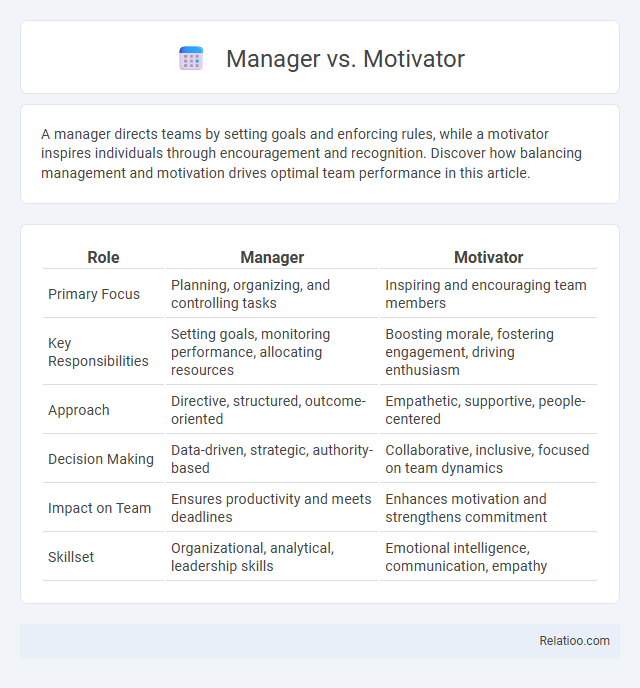A manager directs teams by setting goals and enforcing rules, while a motivator inspires individuals through encouragement and recognition. Discover how balancing management and motivation drives optimal team performance in this article.
Table of Comparison
| Role | Manager | Motivator |
|---|---|---|
| Primary Focus | Planning, organizing, and controlling tasks | Inspiring and encouraging team members |
| Key Responsibilities | Setting goals, monitoring performance, allocating resources | Boosting morale, fostering engagement, driving enthusiasm |
| Approach | Directive, structured, outcome-oriented | Empathetic, supportive, people-centered |
| Decision Making | Data-driven, strategic, authority-based | Collaborative, inclusive, focused on team dynamics |
| Impact on Team | Ensures productivity and meets deadlines | Enhances motivation and strengthens commitment |
| Skillset | Organizational, analytical, leadership skills | Emotional intelligence, communication, empathy |
Understanding the Roles: Manager vs Motivator
Understanding the roles of Manager versus Motivator is crucial for effective leadership in any organization. A Manager primarily focuses on planning, organizing, and ensuring tasks are completed efficiently, while a Motivator inspires and energizes teams to achieve higher performance through encouragement and emotional support. Your success depends on balancing these roles to maintain productivity and foster a positive, driven work environment.
Core Responsibilities: Leading vs Inspiring
Managers focus on planning, organizing, and controlling resources to achieve specific organizational goals, ensuring tasks are completed efficiently. Motivators center on inspiring employees by recognizing their needs and encouraging engagement through emotional and psychological support. Leaders combine both approaches by setting a vision, influencing behavior, and fostering a motivated team to drive long-term success.
Key Skills: Organizational vs Emotional Intelligence
Managers excel in organizational skills such as planning, resource allocation, and process optimization to ensure operational efficiency. Motivators leverage emotional intelligence, including empathy, social awareness, and relationship management, to inspire and influence team members effectively. High-performing leaders integrate both organizational and emotional intelligence to balance task execution with team morale and motivation.
Decision-Making Approaches: Directive vs Collaborative
Managers employing directive decision-making rely on hierarchical authority to provide clear instructions and control outcomes, emphasizing efficiency and consistency. Motivators adopt a collaborative approach by engaging team members in discussions, fostering shared ownership and enhancing commitment to decisions. The balance between directive and collaborative styles affects organizational dynamics, where directive approaches streamline processes, while collaborative methods encourage innovation and morale.
Communication Styles: Instructional vs Encouraging
Managers typically use an instructional communication style, providing clear directions and expectations to ensure task completion and organizational alignment. Motivators tend to focus on an encouraging communication style, inspiring and uplifting team members to foster engagement and motivation. Emphasizing either instructional clarity or encouraging support directly impacts team dynamics and overall performance outcomes.
Impact on Team Performance
A Manager structures workflows and monitors progress to ensure team goals are met efficiently, directly influencing productivity and accountability. A Motivator inspires enthusiasm and commitment, significantly boosting morale and encouraging innovative problem-solving within the team. Your team benefits most when management balances task organization with motivational support to optimize overall performance.
Employee Engagement: Control vs Empowerment
Effective employee engagement hinges on balancing managerial control with motivational empowerment. A manager typically enforces structure and monitors performance, while a motivator inspires and encourages autonomy, fostering intrinsic motivation. Your leadership approach should blend clear guidance with empowering employees to take initiative, enhancing their commitment and productivity.
Conflict Resolution: Authority vs Mediation
Managers exercise authority to enforce rules and resolve conflicts by making decisions that maintain order and achieve organizational goals. Motivators influence others through inspiration and emotional support, often mediating disputes by encouraging open communication and empathy among team members. Your best approach to conflict resolution depends on balancing authoritative decision-making with empathetic mediation to create a productive and harmonious work environment.
Professional Development: Managing Tasks vs Nurturing Growth
Managers excel at organizing tasks and ensuring deadlines are met, providing structure that supports operational efficiency and accountability. Motivators inspire and engage teams by aligning individual goals with organizational vision, fostering a culture of enthusiasm and commitment. Your professional development benefits most when leadership balances task management with growth encouragement, promoting skill enhancement alongside performance achievements.
Choosing the Right Approach for Your Team
Choosing the right approach for your team requires understanding the distinct roles of manager, motivator, and leader. A manager focuses on organizing tasks and ensuring productivity, while a motivator inspires employees by recognizing their needs and driving engagement. Effective leadership combines structured management with motivational techniques to cultivate a productive and committed workforce.

Infographic: Manager vs Motivator
 relatioo.com
relatioo.com